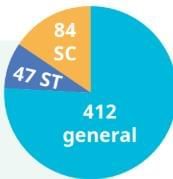Universal Franchise and India’s Electoral System Chapter Notes | Chapter Notes For Class 8 PDF Download
Introduction
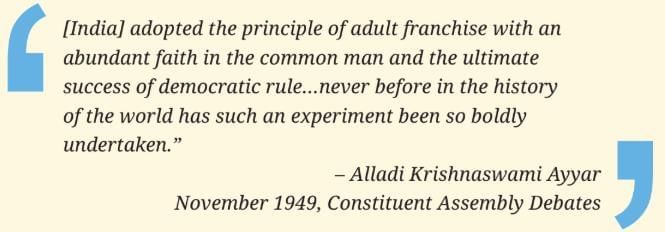
India’s democracy is one of the largest in the world, allowing every adult citizen to vote and choose their leaders through a fair and inclusive electoral system.
Universal Adult Franchise
Every Indian citizen aged 18 and above has the right to vote, making universal franchise a key pillar of India’s democracy.
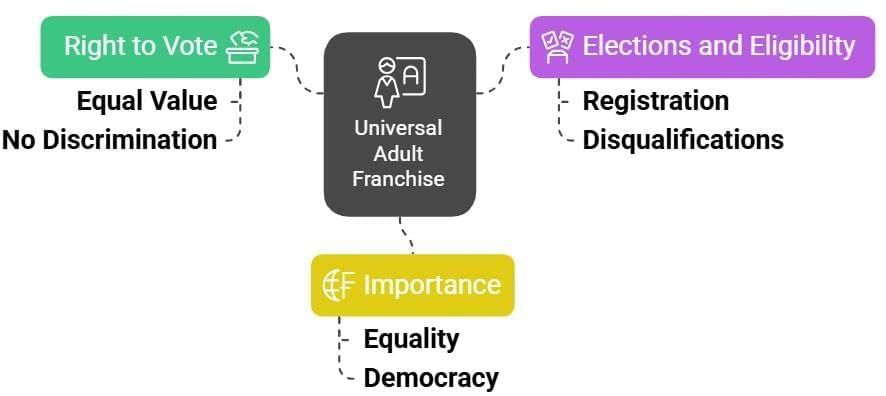
The Right to Vote
- India’s Constitution makers decided that universal adult franchise would be a core feature of Indian democracy from the start.
- Every adult citizen aged 18 and above gets one vote, with all votes having equal value, regardless of caste, creed, race, religion, gender, education, or income.
- The term “universal” reflects this equal right to vote for all eligible citizens.
- Universal franchise is the foundation of Indian democracy, as stated in Article 326 of the Constitution.
Did You Know?
Dive into the electrifying pulse of India’s democracy, where 3.1 million elected representatives, including 1.3 million fierce women, rule over 250,000 local bodies, all chosen through the vibrant power of universal adult franchise!
Elections and Eligibility
- Elections to the Lok Sabha, state legislative assemblies, union territories, and local elections in villages and cities are based on universal franchise.
- No one can vote on behalf of another person.
- To vote, you must be registered as a voter in your constituency, but those guilty of serious crimes may be barred from voting.
- In the 2024 general election, about 980 million voters were eligible to vote for the 543 Lok Sabha constituencies.
Did You Know?
India ignited a global revolution by granting women voting rights from the start, outshining nations like Switzerland, where women waited until 1971. Fueled by ancient values and bold vision, India’s women charged into democracy!Women’s suffrage parade, USA, 1913
Importance of Universal Franchise
- Managing such a massive election requires a well-organised system to ensure fairness and freedom.
- Universal franchise is important because it gives everyone a voice, promotes equality, and strengthens democracy.
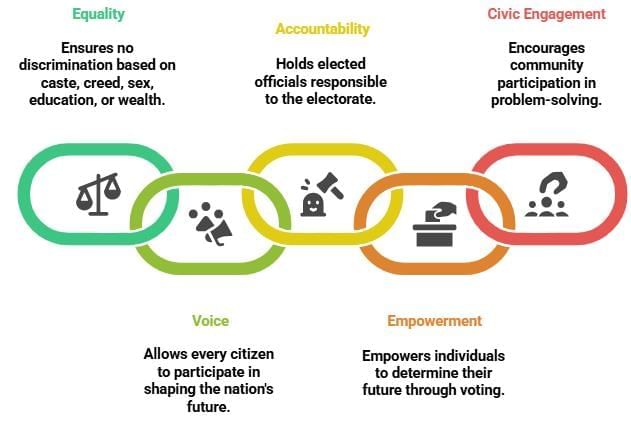
Bridging Barriers, Enabling Participation: Ensuring Universal Franchise
Innovative measures by the Election Commission help every eligible voter, including those in remote areas or with disabilities, participate in elections.
Challenges of Diversity
- Democracy thrives when every eligible citizen can freely and fairly participate in elections, expressing their will through voting.
- India’s large, diverse, and complex nature poses challenges to conducting elections.
- India’s eligible voter population is 15 times larger than the United Kingdom’s, and its area is six times larger than France’s.
- Geographic diversity, such as remote regions, adds to the complexity of organising elections.
Did You Know?
Uncover the 10th-century Uttaramerur inscriptions, showcasing a thrilling election ritual: candidate names on palm leaves, sealed in a pot, drawn by a young boy, and announced by a trusted elder—a dazzling display of transparency!
Accessibility Measures
- The Election Commission of India (ECI) organises elections and works to remove barriers to voting.
- Electoral officials travel to remote locations to ensure every citizen can exercise their democratic right.
- In 2024, for the first time, elderly voters and people with disabilities could vote from home, and postal voting was available for specific categories of voters.
- Assistive technologies, like braille-enabled voter cards and app-based requests for wheelchairs and ramps, were introduced to make voting accessible.
Role of Election Commission of India (ECI)
The Election Commission of India manages the massive task of conducting elections across the country, ensuring they remain free and fair.
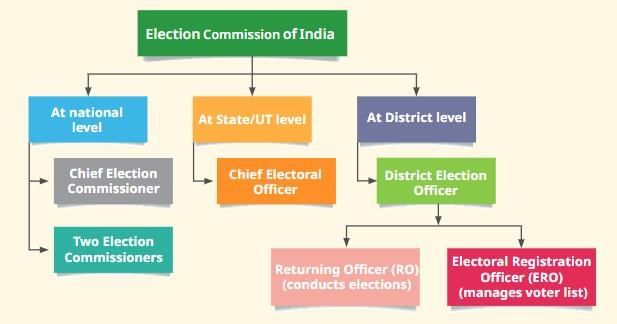 Structure of the Election Commission of India
Structure of the Election Commission of India
Election Commission of India — A brief introduction
- The Election Commission of India (ECI) is an independent constitutional body responsible for conducting free and fair elections in India.
- Established in 1950, it oversees elections to the Lok Sabha, Rajya Sabha, State Legislative Assemblies, and the offices of the President and Vice President.
- The first general elections in independent India were held in 1951–1952.
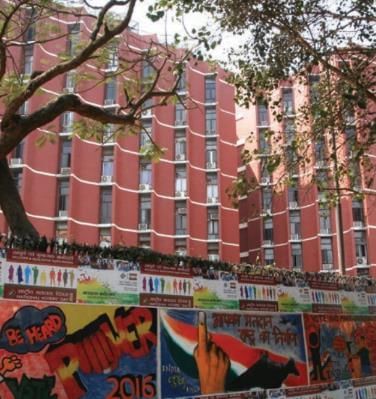 Office of ECI in Delhi
Office of ECI in Delhi
Managing the Electoral Process
- Managing elections in India is a huge challenge due to the country’s size and diversity.
- The ECI continuously upgrades its systems to meet the needs of modern India, ensuring elections are conducted efficiently and fairly.
- The electoral system is massive, as seen in the Lok Sabha elections, which involve millions of voters across 543 constituencies.
Did You Know?
India’s Lok Sabha electrifies with 84 seats for Scheduled Castes and 47 for Scheduled Tribes, amplifying marginalized communities with unstoppable representation in the heart of democracy!
- State assembly elections follow a similar process to Lok Sabha elections.
- Elections occur at different times with fixed schedules, so every year, various polls are conducted across the country based on when they are due.
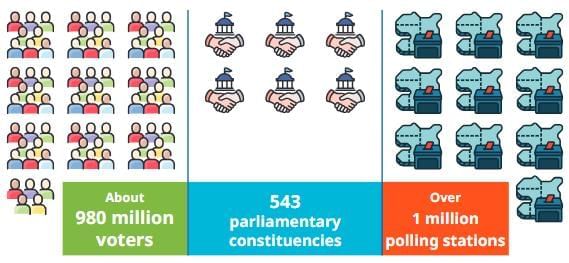 A few numbers showing the scale of the 2024 Lok Sabha elections
A few numbers showing the scale of the 2024 Lok Sabha elections
Model Code of Conduct (MCC)
- The Model Code of Conduct (MCC) is a set of rules to ensure free and fair elections, listing guidelines for leaders, political parties, and candidates.
- Key elements of the MCC include:
(a) Rules for the ruling party to prevent misuse of government resources, such as not announcing new schemes or projects that could influence voters during elections.
(b) Candidates must show restraint and discretion to ensure peaceful elections.
(c) Offering gifts or incentives to influence voters is punishable by law.
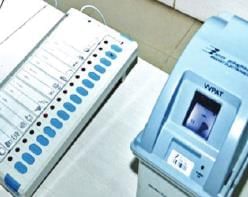 Electronic voting machine
Electronic voting machine
Did You Know?
Kerala sparked a fiery legacy in 1960 with the Model Code of Conduct, embraced by bold parties. By 1991, the Election Commission wielded it as a mighty shield for fair, fearless elections across India!
Did You Know?
In 1990, T.N. Seshan stormed in as Chief Election Commissioner, unleashing voter IDs, ironclad campaign rules, and spending crackdowns, transforming Indian elections into a fearless, transparent triumph!T.N. Seshan
Understanding Elections in India
Elections at various levels, from Lok Sabha to local bodies, allow Indian citizens to choose their leaders in a vibrant democratic process.
Election of the Lok Sabha and State Legislative Assemblies
- Elections in India are often called the “Festival of Democracy,” where citizens freely, fairly, and responsibly choose their representatives.
- India follows a parliamentary system, with elections held for the Lok Sabha (national level), state legislative assemblies (state level), and local bodies (village and city level).
- The country is divided into 543 constituencies for Lok Sabha elections.
- Elected candidates to the Lok Sabha are called Members of Parliament (MPs), while those elected to state assemblies are called Members of the Legislative Assembly (MLAs).
- India uses the “First-Past-the-Post” system, where the candidate with the most votes in a constituency wins, even if they don’t secure 50 per cent of the votes.
Government Formation
- After voting, the party or coalition with a majority of seats in the Lok Sabha forms the national government, and its leader becomes the Prime Minister.
- At the state level, the leader of the majority party becomes the Chief Minister.
- The State Election Commission works with the ECI to conduct elections, including those for local bodies, following universal adult franchise and constitutional provisions.
Did You Know?
India’s legislative assemblies dazzle with names like Vidhan Sabha or Niyama Sabha.
Election of the Rajya Sabha
- Rajya Sabha members are also called Members of Parliament (MPs), but are chosen through indirect elections.
- For example, if a school council is elected by class representatives rather than all students, it’s an indirect election, like the Rajya Sabha.
- Of the 245 Rajya Sabha members, 233 are elected by elected Members of Legislative Assemblies (MLAs), and 12 are nominated by the President of India.
- Each state gets a different number of Rajya Sabha seats based on its population, with larger states like Uttar Pradesh having more seats than smaller ones like Arunachal Pradesh.
- The Rajya Sabha is called the Permanent House because it never dissolves; members serve six-year terms, with one-third retiring every two years.
- The voting uses a “single transferable vote system” to ensure fair representation, especially for smaller states (details to be learned in higher classes).
Election of the President of India
- The President of India is elected indirectly by an Electoral College, not by direct public vote.
- The Electoral College includes:
- Members of Parliament (MPs) from both Lok Sabha and Rajya Sabha.
- Members of Legislative Assemblies (MLAs) from states and the union territories of Delhi and Puducherry. - The single transferable vote system is used to ensure the President has support from both central and state governments.
- More populous states have a greater say in the voting process, but the rules are complex (details not needed at this stage).
- The following groups do not vote in the President’s election:
- - Nominated members of Rajya Sabha (12).
- Nominated members of State Legislative Assemblies.
- Members of Legislative Councils in states with bicameral legislatures.
- Nominated members of Delhi and Puducherry union territories. - Only directly elected representatives vote to maintain democratic legitimacy, as the President represents the people’s will indirectly.
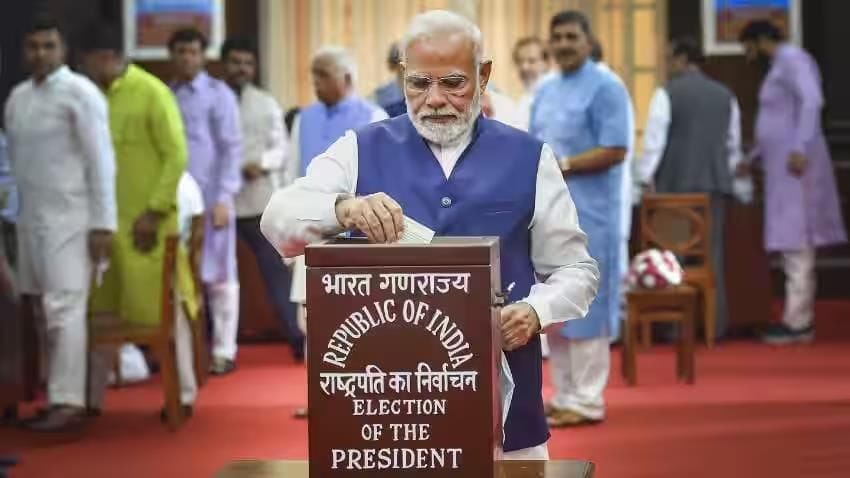 PM Modi voting for Election of the President
PM Modi voting for Election of the President
Election of the Vice President of India
- The Vice President of India is elected by an Electoral College consisting of elected and nominated members of both Lok Sabha and Rajya Sabha, using the single transferable vote system.
- The Vice President serves as the chairperson of the Rajya Sabha and steps in if the President cannot perform their duties.
Challenges and the Road Ahead
India’s electoral system faces issues like money power and voter apathy, but it aims to strengthen democracy through voter awareness.
Current Challenges
- India’s electoral system is the world’s largest democratic exercise, but it faces challenges.
- Issues include the influence of money in elections, candidates with criminal records, and voter apathy, especially in urban areas.
- These challenges raise concerns about the health of India’s democracy.
Strengthening Democracy
- The way forward involves empowering voters with information to make responsible choices.
- Media, education, and awareness campaigns should help people, especially youth, understand the importance of voting wisely.
- An informed and vigilant voter is the strongest protector of democracy, starting with asking the right questions and casting a responsible vote.
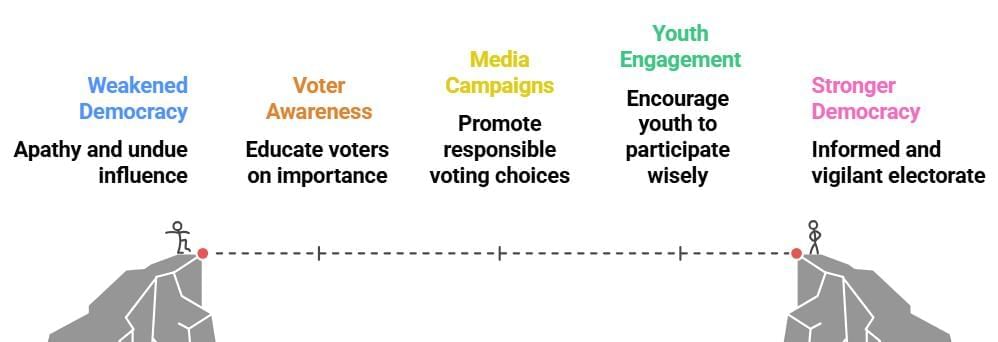
Key Points to Remember: Before We Move On
Universal adult franchise is the cornerstone of Indian democracy.
The right to vote is also a responsibility and should be taken seriously by every voter.
Voter awareness is an important part of exercising the right to vote.
It is important to encourage and support the participation of all eligible voters.
The Election Commission of India is the Constitutional body responsible for conducting elections in the country.
FAQs on Universal Franchise and India’s Electoral System Chapter Notes - Chapter Notes For Class 8
| 1. What is Universal Adult Franchise and why is it important in India? |  |
| 2. How does the Election Commission of India (ECI) ensure free and fair elections? |  |
| 3. What are the main challenges faced by the electoral system in India? |  |
| 4. What role does education play in promoting Universal Adult Franchise in India? |  |
| 5. How has the concept of Universal Adult Franchise evolved in India since independence? |  |


